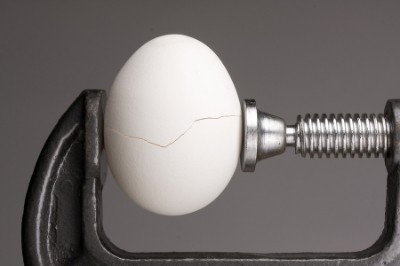Word Of the Week #555: Pressure
March 25, 2015 by Susan Clarke · Comments Off on Word Of the Week #555: Pressure
Pressure – an urgent claim or demand.
How much pressure do you feel you are under at work? How about in your personal life? Do you know the difference between pressure and stress?
This week the Financial Times of London writer Stefan Stern’s article “Advice on dealing with pressure” caught my eye. He writes, “Keith Miller, the famous Australian cricket player and World War II pilot, was once asked about the pressure of playing sports at the highest level. ‘I’ll tell you what pressure is. Pressure is a Messerschmitt up you arse; playing is not.’
Hendrie Weisinger, a psychologist, and JP Pawliw-Fry, a performance coach, provides an unusually sharp account of work and performance under pressure in their book “Performing Under Pressure.” They achieve this partly by drawing on the growing body of research into the bio-chemical workings of the brain, but also by simply observing real life and talking to interesting witnesses, more than 12,000 people over the last decade.
Take, for example, their useful distinction between pressure and stress. “With pressure, something critical is on the line. Having a disagreement with your wife about how to discipline your firstborn child is stressful. Escaping a predator chasing you is more than just stress: it’s pressure – either you find a way to escape or fend off the predator, or you potentially will die.”
The distinction matters because in mistaking stress for pressure, “we react physically, mentally and behaviorally in ways that are out of proportion to the circumstances…misdiagnosing stress as pressure reduces our abilities needlessly.”
Under pressure, the authors say, we can become “mentally rigid.” We are more uptight in how we show up; more defensive when tough questions are asked, less warm and a little more ill at ease, and less able to engage in humor.” Also, we are less creative.
Blunt instruments such as financial incentives do not help either, because research has shown that these increase pressure on those seeking them, leading to “cheating, deception, and poor employee relationships,” the authors say.
In one section, the authors list more than 20 techniques for curbing bad physiological responses to pressure, providing tips to help deal with them. Lastly, they discuss at greater length how four key components – confidence, optimism, tenacity, and enthusiasm – can all be developed to equip us to manage pressure situations.”
This week’s focus is on the difference between pressure and stress. Have you ever reacted in ways that were out of proportion to the circumstances? Do you tend to be rigid and defensive when tough questions are asked? Could you be better prepared to deal with unavoidable pressure?
I LOVE feedback! Join my Facebook community on my FUN-damentals Fan Page.


